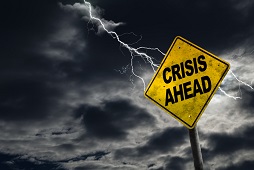CNBC: JP Morgan's Top Quant Warns Next Crisis will Feature Flash Crashes and Social Upheaval Not Seen in 50 Years

Article by High Son on CNBC Financial
Sudden, severe stock sell-offs sparked by lightning-fast machines. Unprecedented actions by central banks to shore up asset prices. Social unrest not seen in the U.S. in half a century. That's how J.P. Morgan Chase's head quant Marko Kolanovic envisions the next financial crisis.
The forces that have transformed markets in the last decade, namely the rise of computerized trading and passive investing, are setting up conditions for potentially violent moves once the current bull market ends, according to a report from Kolanovic sent to the bank's clients on Tuesday. His note is part of a 168-page mega-report, written for the tenth anniversary of the 2008 financial crisis, with perspectives from 48 of the bank's analysts and economists.
Kolanovic, a 43-year old analyst with a PhD in theoretical physics, has risen in prominence for explaining, and occasionally predicting, how the new, algorithm-dominated stock market will behave. The current bull rally, the oldest in modern history by some measures, has been characterized by long periods of calm punctuated with spasms of selling known as flash crashes. Recent examples include a 1,600 point intraday drop in February and a 1,100 point decline in August 2015.
"They are very rapid, sharp declines in asset values with sharp increases in market volatility," Kolanovic, the bank's global head of macro quantitative and derivatives research, said in a recent interview. But those flash crashes occurred during a backdrop of a U.S. economic expansion; the new market hasn't been tested in the throes of a recession, he said.
"If you have these liquidity-driven sharp selloffs that come at the end of the cycle, or maybe even causes the end of the cycle, then I think you can have a much more significant asset price correction and even more significant increase in market volatility," Kolanovic said.
No One to Step in and Buy
In his report, Kolanovic explains how the major market trends that occurred after the 2008 crisis exacerbate selling during moments of panic. The massive shift from active to passive managed investments — he estimates that $2 trillion has moved that way in the past decade — has removed a pool of buyers who can swoop in if valuations tumble, he wrote.
The rise of automated trading strategies is also a factor because many quant hedge funds are programmed to automatically sell into weakness, he said. Together, index and quant funds now make up as much as two-thirds of assets under management globally, and 90 percent of daily trading comes from those or similar strategies, he wrote.
"Basically, right now, you have large groups of investors who are purely mechanical," Kolanovic said. "They sell on certain signals and not necessarily on fundamental developments, such as increases in the VIX, or a change in the bond-equity correlation, or simple price action. Meaning if the market goes down 2%, then they need to sell."
Lastly, electronic trading desks at banks and other firms tend to withdraw when markets get rough, removing liquidity and contributing to a cascading decline in prices.
The 'Great Liquidity Crisis'
Kolanovic says that this potential meltdown in stock prices could cause the next financial crisis.
His name for it: the Great Liquidity Crisis. (In markets, liquidity is a measure of the ease and speed a financial instrument can be traded without significantly impacting its price. For example, cash is highly liquid. Meanwhile real estate is usually illiquid.)
If markets fall by 40 percent or more, the Federal Reserve would need to leap into action to prevent a spiral that led into depression, Kolanovic said. That could lead to unconventional actions, including direct purchases of equities, a move that Japan's central bank has already taken.
"Suddenly, every pension fund in the U.S. is severely underfunded, retail investors panic and sell, while individuals stop spending," Kolanovic said. "If you have this type of severe crisis, how do you break the vicious cycle, the negative feedback loop? Maybe you stimulate the economy by cutting taxes further, perhaps even into negative territory. I think most likely is direct central bank intervention in asset prices, maybe bonds, maybe credit, and perhaps equities if that's the eye of the storm."
In an hour-long interview, Kolanovic said this scenario is less a prediction than a warning about a rising risk. The exact timing of this crisis is uncertain but will be determined by the speed in which the Fed hikes interest rates and reverses bond-purchases (a legacy of the last crisis), he said.
Kolanovic ends his report on an ominous note: "The next crisis is also likely to result in social tensions similar to those witnessed 50 years ago in 1968."
That year saw the peak of both the Vietnam war and anti-war movement and the assassinations of Martin Luther King Jr. and Senator Robert Kennedy. Today, the internet and social media are helping to polarize groups, and events including the U.S. election and Brexit show tensions that will probably worsen in the next crisis, he said.
He was a bit more measured in his interview. If central banks can head off the worst of a crisis by providing a floor for asset prices, then the status quo will probably be maintained, he said.
"If they don't manage to," Kolanovic said, "then you're spiraling into depression, social unrest and a lot more disruptive changes that can negatively affect returns for a very long time."
To read this article on CNBC Financial Website, click here